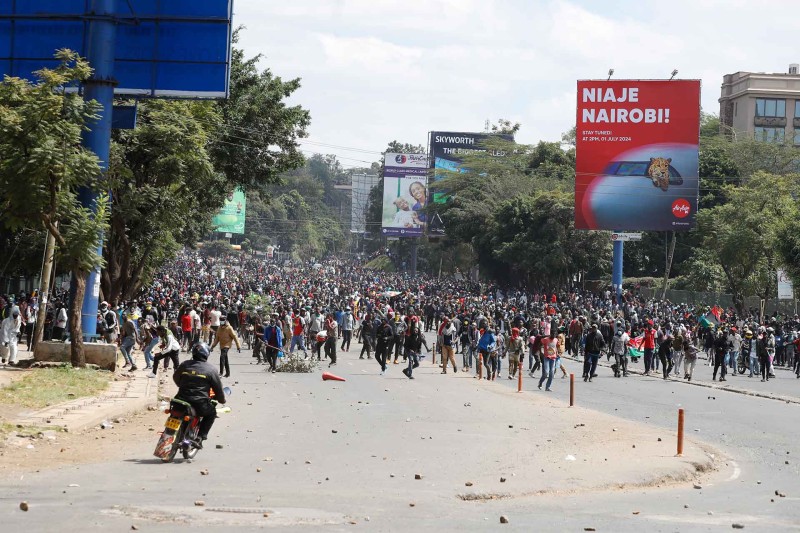Last week, a whistleblower sparked outrage in Kenya after he claimed in a social media post that the country’s main airport would be leased to one of India’s largest conglomerates, Adani Group.
Kenyans angered by the deal’s lack of transparency planned to occupy Jomo Kenyatta International Airport in Nairobi in protest. A senator immediately requested that the government provide information about the plan, which had never been publicly mentioned before. On Tuesday, a coalition of Kenyan civil society organizations wrote to the Kenya Airports Authority (KAA) demanding full disclosure.
Now, OCCRP can reveal that although experts advised the Kenyan government to put out a public tender to expand the airport, the government instead allowed a “privately-initiated proposal” submitted by Adani Airport Holdings Inc in March to move forward. According to documents seen by OCCRP, the Adani proposal was approved to proceed to the “project development phase,” which entails additional consultation and negotiation.
It is unclear why or how a privately-initiated proposal even came to be considered as an option for the airport expansion project. In February, when Spanish consulting firm ALG concluded a feasibility study for the project, it recommended using a “competitive bidding procedure” to “maximize the value-for-money for the Contracting Authority.”
“We are not aware of any privately-initiated proposal for the Project (and generally we do not advise to use such methods),” the study said. (ALG did not respond to a request for comment.)
The following month, however, Adani submitted a privately-initiated proposal (PIP) for a long-term concession to expand and operate the airport for 30 years in what’s known as a “build, operate, transfer” deal, according to documents obtained by OCCRP.
Adani Group, one of India’s largest and most politically influential conglomerates, has interests in energy, agribusiness and weapons as well as its airport division. But it has also been hard-hit by scandal in recent years, including accusations of fraud and insider trading. (It has denied the claims).
In its proposal to the Kenyan government, Adani argued that a PIP “offers distinct advantages over competitive bidding.”
“PIP allows the government to secure terms beyond purely financial considerations, ensuring the welfare of citizens,” it wrote. “Conversely, competitive bidding risks making the deal purely transactional, without room for mutual considerations. A PIP creates a win-win scenario for the people of Kenya, the GOK, and private investors.”
Under the terms of its $2.047-billion proposal, Adani would build and refurbish airport terminals, improve its taxiways, and possibly construct a new runway. These improvements would be financed by revenue from the airport, increasing airport fees, and raising money from private investors. After 30 years, Adani would receive an 18-percent equity stake in the airport. A separate document seen by OCCRP noted that this figure was high for an airport concession.
The Adani proposal also said the success of the airport project would be “highly dependent on favorable tax policies” and asked that the Kenyan government consider “exempting it from corporate income tax derived from the concession for certain years.”
The Adani Group did not reply to a request for comment.
The CEO of KAA, Henry Ogoye, wrote in a statement on X that Adani Airport Holdings Inc. had indeed submitted a proposal to build a terminal and improve the infrastructure. He said the proposal would be “subjected to technical, financial, and legal reviews along requisite due processes.”
In his statement, which was also sent to OCCRP in response to a request for comment, Ogoye also said that investment required for the airport was “significant” and could not be executed “without recourse to private funding.”
But Nelson Amenya, the digital entrepreneur who had originally revealed the proposal on X on July 11, said he was concerned that the terms of the potential deal had been kept completely secret from the public.
“This deal has been done clandestinely,” Amenya told OCCRP.
After obtaining the documents, Amenya contacted Kenyan Senator Richard Onyonka about the project. Onyonka immediately wrote to the Standing Committee on Roads and Transportation requesting information on the deal. On Wednesday he addressed parliament, asking for the KAA board to be summoned.
“The right things were not done, there were no public hearings,” Onyonka told OCCRP. “We should table the agreement, look at it, and evaluate it.”
A feasibility report seen by OCCRP also stipulated that KAA would be responsible for “mitigating and managing any public opposition [or] protestor actions,” related to the airport project.
This appears to have been prescient, #OccupyJKIA started trending on social media shortly after Amenya’s post, and thousands of Kenyans planned to head to the airport to protest. The anger over the airport deal came amid a turbulent month in Nairobi, which has already been convulsed by protests over proposed tax hikes and alleged corruption in the government of President William Ruto.
On Monday evening, the National Police Service warned protesters against accessing the airport, which is classified as a protected area in Kenya. On Tuesday after a heavy ground and surveillance presence was deployed by police, protesters flooded into Nairobi’s central business district instead and were met with heavy tear gas by police.
Last week, a letter submitted to the KAA on behalf of “the people of Kenya” asked why the authority was “surreptitiously rushing to conclude” the privately-initiated proposal with Adani. Titus Makhanu, public advocate and author of the letter, told OCCRP his firm planned to submit a petition to a court in Nairobi by this Friday “to stop the takeover.”
Meanwhile, following public outrage, the Kenyan government tried to make it clear that the deal did not entail selling the airport.
“JKIA is not on sale,” said Prime Cabinet Secretary Musalia Mudavadi. “It is a strategic asset and if it was going to be sold, it can only be done after a full public process that Parliament endorses.”



